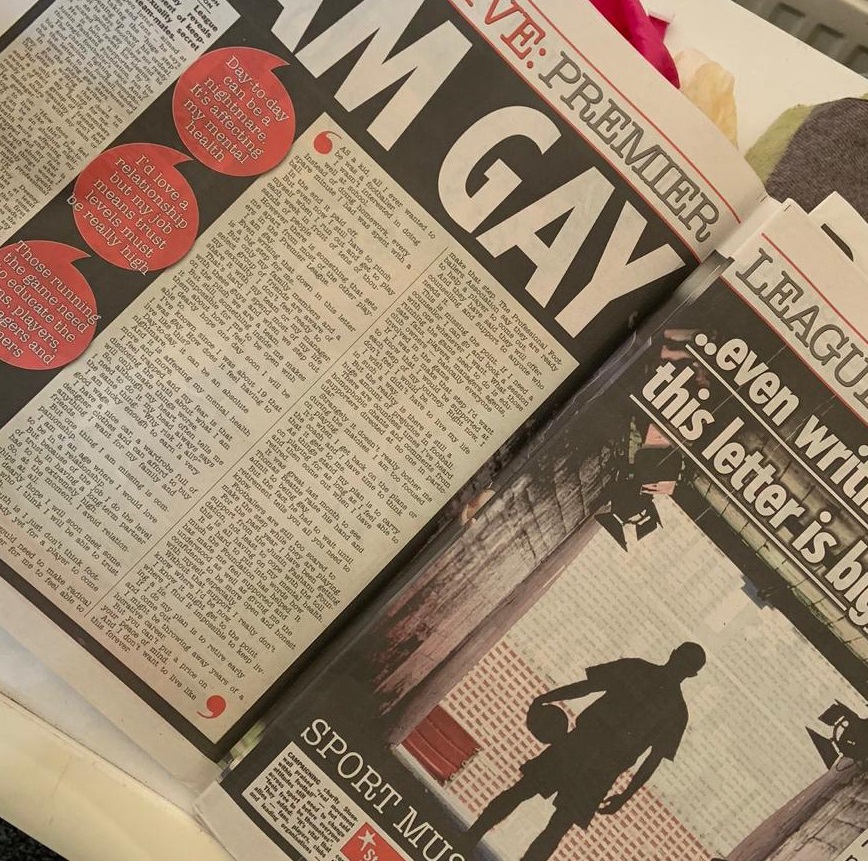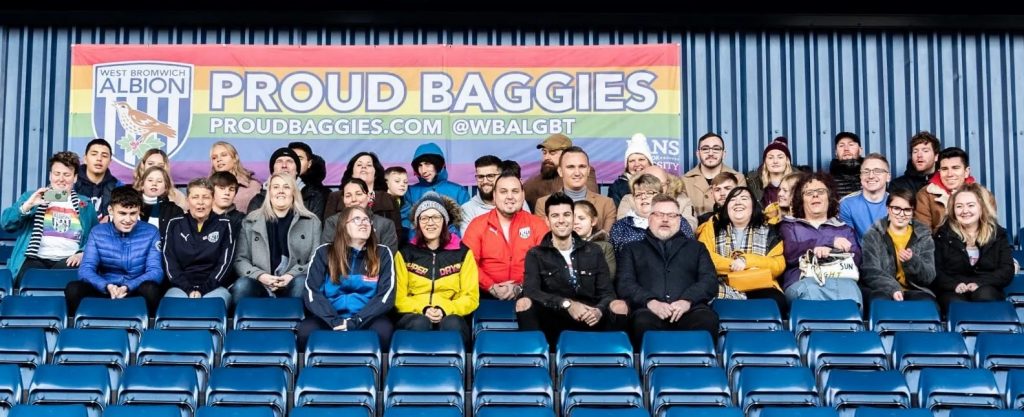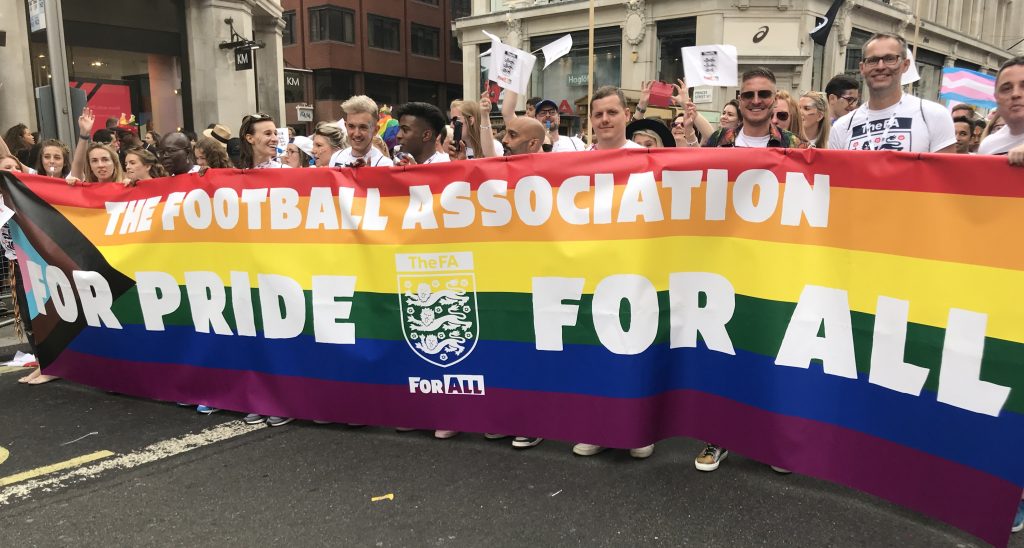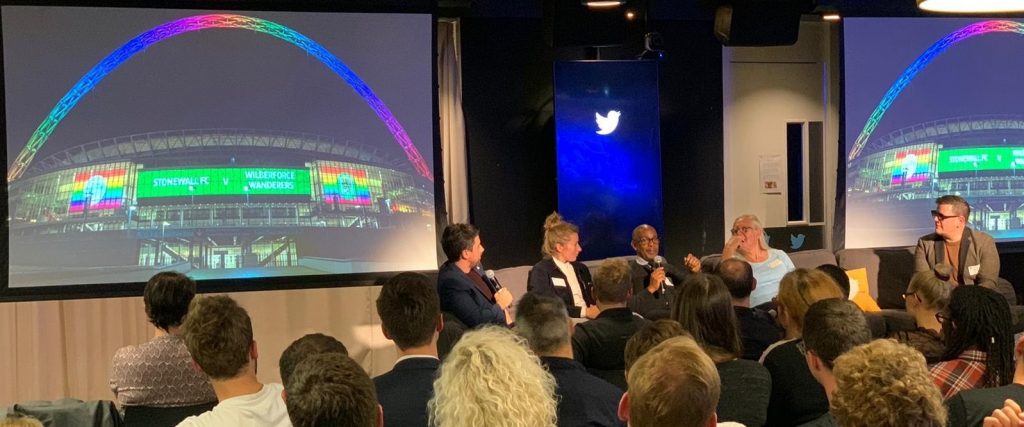Seeing the light: The media and gay footballers

A media frenzy about a mystery Premier League player has renewed calls for greater LGBT+ education in football. So what’s the state of play?
By Jon Holmes
Last weekend, there was extensive media coverage about the challenges and pressures that a gay or bi male professional footballer might face.
Articles on this topic have been a staple of certain publications for many years, with claims often made about the experiences of unnamed players, sparking further coverage in other outlets.

These types of articles are usually accompanied by silhouette pictures and limited details about the football personalities involved, so as to preserve an appearance of anonymity but also to stimulate public interest.
In recent years, social media has heightened this interest further, inevitably resulting in speculation about who the players might be, and debate over how football’s stakeholders – such as governing bodies, clubs, players’ unions, fans, and the media – should take action to help improve their situation.
On Sports Media LGBT+’s social media platforms on Saturday, we reacted to this latest tabloid front-page lead by re-iterating our unequivocal support for gay and bi footballers at all levels of the game and signposting our Rainbow Ready resources on how the media can cover this topic without stirring up speculation.
As a group, we are part of a wider connected network from across the football family, all of whom are committed to creating LGBT+-inclusive environments in sport. Most of us in this network are lesbian, gay, bi and trans ourselves; those who are not have proven track records as allies working in equality, diversity and inclusion from grassroots to the elite level.
We understand that for all those in the LGBT+ community, the complex processes of self-acceptance and subsequently ‘coming out’ are intensely personal and heavily influenced by external factors. We advocate strongly for empowering media coverage, drawing upon our own experiences, the stories shared by others, and numerous studies that demonstrate overwhelmingly that LGBT+ people are healthier and happier when they feel supported to be their authentic selves.

For many people, sexual orientation is a part of their identity over which they may exercise a measure of privacy, particularly if they are individuals who are in the public eye. We respect that this is their journey, and we trust them to navigate this in a way that does not stir up gossip which could affect the mental wellbeing of others.
Our collective is united in the concern that media coverage such as that seen in recent days is not helping to create a climate in which a footballer in the modern men’s game who is gay or bi would feel empowered to be authentic. Instead, it is our belief that this coverage perpetuates a ‘searchlight’ culture in which the prospect of a professional player potentially coming out publicly – an event that would undoubtedly be met with an outpouring of goodwill from across society, and huge media attention – is teased to the general public. This reduces the topic of sexual orientation in sport to sensationalism, and in some instances, attempts to monetise it, which is irresponsible and distasteful.
As seen in last weekend’s coverage, these articles are increasingly presented with a call for greater LGBT+ education to be undertaken across the game, a goal we naturally support. Yet what they rarely highlight is the work that is currently being done – it is extensive and purposeful, and continues to make a significant impact in fighting homophobia and biphobia in football.
This work encompasses:
- Schools and academies, where workshops that address all forms of discrimination are delivered to thousands of young people every year by experts and professionals from organisations like Kick It Out and Football v Homophobia / Pride Sports UK

- Supporters groups under the Pride in Football umbrella who are collaborating with their clubs, and advising fellow fans and stewarding teams on how offensive language and behaviour can make people feel unwelcome and unsafe

- The FA’s ‘In Pursuit of Progress’ strategy, which promotes LGBT+ inclusion across the game, backed up by events such as the annual LGBT History Month reception at Wembley, Pride month activations, and backing for a range of awareness campaigns

- The PFA‘s detailed support structures and policies
- The Premier League and EFL’s vocal and visible sharing of the inclusive message of Stonewall’s Rainbow Laces campaign, which is supported by the coalition of TeamPride businesses and brands such as Coca-Cola, Barclays and Aviva
- The proactive steps taken by organisations and initiatives such as Inside Inclusion, led by Chris Gibbons who is Chelsea FC’s equality consultant; Just A Ball Game?; Show Racism The Red Card; the EGLSF (European Gay & Lesbian Sport Federation); GFSN – who co-ordinate competitions for over 20 LGBT+-inclusive football clubs across the UK, such as Stonewall FC and Charlton Invicta FC – and Fans For Diversity, a joint venture by the Football Supporters’ Association and Kick It Out
Improved funding from the elite level and better infrastructure could extend the reach of this work even further. As has been seen recently with the fight against racism in football, a unified, joined-up approach throughout the game with allies speaking up in support of minority groups who face discrimination can have a phenomenal impact.
As far as the media is concerned, resources have been made freely available to those working in the industry; these explain how to communicate LGBT+ inclusion successfully to large audiences. In addition, the stories shared by out LGBT+ people working in football – such as women players, referees, player care professionals, non-league coaches and managers (e.g. Luke Tuffs’ recent profile by Adrian Chiles in The Sun), and administrators – through print, digital, radio, podcasts and social media make a powerful, personal connection.

At this time, Sports Media LGBT+ urges all those involved in football who are committed to the ongoing fight against LGBT-phobia to share best practice; to widen the conversation and bring in more of the game’s key figures, such as agents, club owners and senior leaders, giving them the confidence to state unequivocally that a gay or bi male player would have their full support and understanding; and to collaborate with editors and journalists who want to help dispel the fear and anguish that have characterised these narratives for far too long. On the latter point, we recommend Cyd Zeigler’s comment piece on Outsports which addresses this further.
Whether at Premier League level, EFL, non-league, or grassroots, everyone in the men’s and women’s game who happens to be gay or bi has their own tale to tell, in the manner of their choosing. Each will appreciate that retaining control is crucial, and the damage that speculation can cause.
Many in our wide football family of LGBT+ people have already left the shadows behind. For the good of the game, we ask for visibility to be shone on their stories, their education work, and their passion for sport, creating a positive glow of pride, not fear.
Jon Holmes is the founder and network lead of Sports Media LGBT+.
Further reading…
Time for solidarity, not salaciousness, over male footballers’ sexuality (Matt Dickinson, The Times)
‘Rainbow Ready’: Media resources on LGBT+ inclusion in sport


